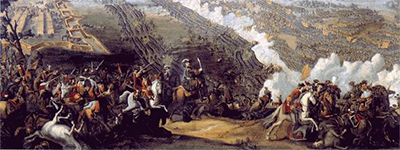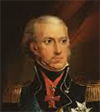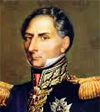The French Invasion of Russia in 1812
Part 2: Alliances and Battle Plans
Also at this time, Scandinavian intrigue was heating up. The King of Sweden, Charles XIII, was very old and had no heir and so had designated as his successor the former French Marshal Jean-Baptiste Bernadotte, who had been thrown out of the army by Bonaparte for insolence and had fled to Sweden.

Sweden was also significant in that it contained a precedent for the French invasion of Russia. A century before, then-King Charles XII had invaded Russia, from his base in Poland, during the Great Northern War. After initial success, Charles eventually had to call off the invasion, in part because the Russian leader, Peter I, had adopted a scorched earth policy in order to deny the invaders any benefits from the land through which they marched. The Russian army defeated the Swedes in May 1709, at the Battle of Poltava (left). Of the 40,000 men in the Swedish army who began the invasion, in January 1708, Charles escaped with 543. He had lost the rest to battle and winter-induced starvation. Even though the war in Spain continued to go badly for France, Bonaparte ordered an invasion of Russia. In February 1812, before Russia had cemented its alliances with Sweden and the U.K., Bonaparte mobilized his very large army and called for reinforcements from Austria, Prussia, and France itself, including pulling French troops out of Spain. They began the move eastward in May. In all, more than 650,000 troops made up the invasion force. It was the largest such armed force ever assembled in Europe. The preparations for this invasion were monumental:
The French army, during its many years of warfare in recent memory, had become very good at foraging for supplies. That living off the land included not only seizing food, water, clothing, and other resources from the surrounding population but also profiting from the spoils of war in the form of assets seized taken from prisoners or from enemy dead. Bonaparte knew that much of the territory of western Russia would not lend itself to such a strategy, which is why the supply trains were so large and so burdened. Next page > Invasion and Evasion > Page 1, 2, 3, 4, 5 |
|
Social Studies for Kids
copyright 2002–2026
David White



 France had gone to war with Portugal in 1808 in an attempt to close a "loophole" in the Continental System–namely, that Portugal was the only country on the Continent that had not joined the Continental System but, instead, was facilitating smuggling and other means of continuing international trade with the U.K. Bonaparte had instigated a coup in Spain, placing his own brother on the throne and starting a large-scale insurgency that required hundreds of thousands of French troops to pacify. The occupying French were initially unable to contain the situation, and Bonaparte and 200,000 reinforcements arrived to keep the peace. Thus, when Russia effectively removed itself from the trade war with the U.K., Bonaparte began to make plans to make Alexander pay.
France had gone to war with Portugal in 1808 in an attempt to close a "loophole" in the Continental System–namely, that Portugal was the only country on the Continent that had not joined the Continental System but, instead, was facilitating smuggling and other means of continuing international trade with the U.K. Bonaparte had instigated a coup in Spain, placing his own brother on the throne and starting a large-scale insurgency that required hundreds of thousands of French troops to pacify. The occupying French were initially unable to contain the situation, and Bonaparte and 200,000 reinforcements arrived to keep the peace. Thus, when Russia effectively removed itself from the trade war with the U.K., Bonaparte began to make plans to make Alexander pay.

 The force included total of 200,000 animals. Of those, 80,000 were cavalry horses and 30,000 were artillery horses; none of them had winter horse shoes. The rest were draft animals, pulling wagons containing weapons and supplies.
The force included total of 200,000 animals. Of those, 80,000 were cavalry horses and 30,000 were artillery horses; none of them had winter horse shoes. The rest were draft animals, pulling wagons containing weapons and supplies. Also accompanying the army were the means to construct supply depots along the way.
Also accompanying the army were the means to construct supply depots along the way.
